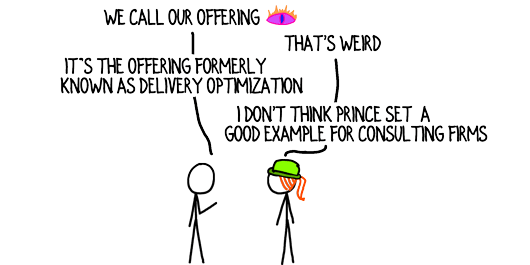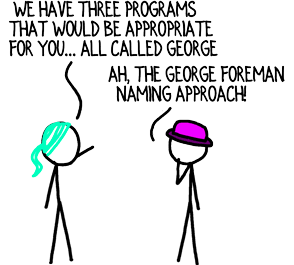While your consulting firm’s name is, ideally, memorable, it’s even more important to ensure your consulting firm’s offerings are mentally sticky.

Imagine if your consulting firm owned an offering as widely known as Net Promoter Score (Bain & Company, Fred Reichheld) or the Magic Quadrant (Gartner).
Sure, your consulting firm’s named offering and my company’s Firm Growth Lab may not have quite as much renown as McKinsey’s Organizational Health Index (yet), however, our branded offerings reap multitude of benefits, including:
- Credibility – A name implies your consulting firm’s offering is concrete, fully-developed and robust. The Chocolate Assessment Program is, implicitly, well thought through. In contrast, a generic, unlabeled series of steps in a proposal looks more like an approach you just developed; i.e., untested and unproven.
- Shorthand – It’s useful for your team and for your clients to agree on a common term to describe a well-defined a set of activities and/or outputs. When you ask your team to “work on the wafer CAP,” they know you’re referring to the Chocolate Assessment Program. Quick and confusion-free.
- Memorability – A crisp name makes your offering easy to remember and, just as important, easy for clients and prospects to mention to each other. When you receive an inquiry stating, “I heard about your Chocolate Assessment Program and would like that implemented at my company,” then you know your offering and offering name are working for you.
- Equity – Your named offerings could become valuable, sellable assets. With years of practice, benchmarks and public recognition attached to your Chocolate Assessment Program, a larger consulting firm may pay a premium to acquire your offering.
Names apply to all manner of consulting firm offerings, including frameworks, services, reports, deliverables, approaches and more. A few helpful rules for naming products are outlined in this post.

Other well known consulting offerings include Gallup’s CliftonStrengths Assessment, the Edelman Trust Barometer, and Tower Watson’s Global Workforce Study.
What’s the best consulting firm offering name of all time? Maybe we can answer that collectively.
Post in the comments some of your favorite, named offerings. (Feel free to include your firm’s named offerings on the list, but do not include links—those will be rejected by my team.)
Text and images are © 2024 David A. Fields, all rights reserved.

 David A. Fields Consulting Group
David A. Fields Consulting Group 

What is better than your own name? ‘David A. Fields Consulting Group’. That does not define anything that you do except consulting – for what? Chocolate concoction? Bridge and Roadway work? Physical fitness training?
David – this is not meant to be snarky and I apologize if it comes off that way. My company name is also my name – Mitchell A. Fink Associates, LLC.
Happy to chat with you any time.
Mitchell
Snarkiness is fine, Mitchell–we’re pretty easygoing around here. This particular article wasn’t about firm names, it was about offering names. To learn more about the pros and cons of using your own name for your firm, take a look at Your Brand vs. Your Consulting Firm’s Brand. Which Should Win?.
Either way, thanks for jumping into the conversation, Mitchell.
Health Insurance Strategy Audit (HISA)
Strategic Health Insurance Creation (SHIC)
Dynamic Benefits Mgmt
Valor – Central Florida’s Health Plan
Performance-Based Consulting
All outstanding offering names, Donovan. Well done and thank you for sharing!
Alas, I don’t have 1 program with a catchy name. Closest might be SOAP (Strategy on a Page) but I didn’t make that one up. As for famous, Gallup’s Q12 and their StrengthFinders did quickly come to mind as did the Exponential Organizational SCALE (staff on demand, community, algorithms, leveraged assets, engagement) model but I use that so my focus might not as mainstream! Enjoy your vacation!
One Page Strategy?
Yes, high level to connect context to concept. Glad to share more if of interest.
I could be wrong, Bill, but I think Troy was suggesting rebranding your “Strategy on a Page” as the “One Page Strategy.” It’s a good suggestion–what do you think about testing that out?
Good suggestion, Troy. OPS would be an upgrade over SOAP.
I missed the suggestion, my apologies Troy. As for OPS, it is nice but SOAP ends to make people stop and ask questions. I’m having a follow up call with a client that I created a strategy for and I’m going to ask them which they prefer, could be an interesting conversation! Will share feedback.
TOPS would also make people ask questions. (The One Page Strategy.) Who doesn’t want a one page strategy, and TOPS arguably has more positive, strategic and business-oriented connotations than SOAP. Let me know how your clients react, Bill!
It’s never too late to start branding your offerings, Bill. The late Jim Horan, a good friend and developer of the One Page Business Plan would probably find your Strategy on a Page to be an excellent start. “SOAP” may not be where you want to end up, but you have something to work with!
Thanks for joining the conversation, Bill!
As a professional name developer, I loved this article (and the one you wrote about handles). In fact you captured many of the items I list in my free name evaluation tool. Personally, I think the most important aspect is what you call “Include a conceptual tie” or I call “Does it deliver the idea or concept behind the product; does it convey something real and specific about the product?” The name should hint at the service offered because most companies do not have large advertising budgets to create meaning behind the name.
@Mark Prus – I’m just starting my fractional coo practice that will specialize in Exit Planning. However, the service offering is somewhat generic. Drive Value & Growth and everything that entails. Given I am planning to be a solopreneur and may never have more than 20 clients (in the lifetime of my practice which might be 5-7 years)….. do I need a company name? And if so, are there any ‘DIY’ resources you could suggest to help me as I don’t have a big budget to hire an expert namer like yourself 🙂
Teresa, in terms of company names (as opposed to offering names, which is what this article was about), you may want to check out this article: Your Brand vs. Your Consulting Firm’s Brand. Which Should Win? Your consulting practice does not need a name if you’re trading purely on personal relationships and you’re not planning on growing past a couple of cash-generating clients for yourself. In that case, you don’t have a firm–you’re a freelancing consultant. However, I’d recommend incorporating anyway, in which case you’re going to need some sort of name to go on your forms.
Good on you for soliciting advice from the start, Teresa!
Thanks for your input David! Your perspective is valued!
You betcha, Teresa!
Teresa. I’d put a link to some naming resources for you but links are not permitted on this site. Nevertheless, if you search Google for DIY Naming you will find my guide to developing a name on your own. Reach out if you need further assistance!
Mark, thanks for respecting the site rules. Much appreciated. Also, thank you for supporting the consulting community!
Thanks Mark. I found your toolkit and purchased the 75 pager version. I’m meeting a friend with some marketing experience on Monday and we’re going to give this a whirl. I’ll let you know how far we get 🙂
Very well said, Mark. Many consultants make the mistake of being too clever and coming up with names they think are catchy but don’t communicate anything. On the opposite side of the spectrum are the old generic-named products. (Remember the cans labeled “Beer”?) Between those poles there’s a lot of room for great names.
By the way, I highly recommend other readers check out Mark’s excellent work.
Mark, thanks for lending your wisdom to the discussion.
Situational Leadership® has wide-spread recognition.
Also DiSC® with the little “i” allowed CCL to brand the non-proprietary DISC as their own .
Two excellent examples, Gwen. Thank you for pointing them out.